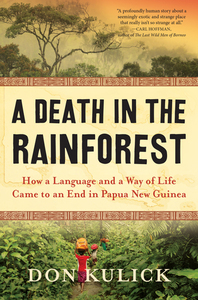Take a photo of a barcode or cover
50 reviews for:
A Death in the Rainforest: How a Language and a Way of Life Came to an End in Papua New Guinea
Don Kulick
50 reviews for:
A Death in the Rainforest: How a Language and a Way of Life Came to an End in Papua New Guinea
Don Kulick
informative
reflective
medium-paced
challenging
emotional
funny
informative
reflective
sad
fast-paced
Kulick wants us to ask ourselves about our own notions about the Other - what do we assume about the people he is speaking about, without knowing them, without ever meeting them? He also wants to shift our perspective from "blaming" the Gapuners for not holding on to their native language - but instead looking at the big picture of what has lead to this loss, why it's happening, and why it matters.
In the end, I would argue that Kulick's book is less about the Tayap language than it is about the effects of colonialism as illustrated through the narrow perspective of one culture, one people, and one short period of time (the 1980s to mid 2010s). Through this narrowed perspective, Kulick is able to illustrate the way colonialism and westernization has continued to effect and harm those involved - even if it seems we are in a "post-colonial" world.
By putting this image in-front of the reader, Kulick calls into question the responsibility of the (assumedly Western) reader to engage with the effects of colonialism and the world view and situation of less privileged peoples across the globe. Without asking or telling us, Kulick directly questions our own perceptions of civilization, progress, education, infrastructure, growth, change, and development by making us look at the Gapuner's situation and question if the Western ideal of any of these things would actually improve anything.
In the end, I would argue that Kulick's book is less about the Tayap language than it is about the effects of colonialism as illustrated through the narrow perspective of one culture, one people, and one short period of time (the 1980s to mid 2010s). Through this narrowed perspective, Kulick is able to illustrate the way colonialism and westernization has continued to effect and harm those involved - even if it seems we are in a "post-colonial" world.
By putting this image in-front of the reader, Kulick calls into question the responsibility of the (assumedly Western) reader to engage with the effects of colonialism and the world view and situation of less privileged peoples across the globe. Without asking or telling us, Kulick directly questions our own perceptions of civilization, progress, education, infrastructure, growth, change, and development by making us look at the Gapuner's situation and question if the Western ideal of any of these things would actually improve anything.
I was pretty sure how it was going to end and not sure I wanted to invest the time in the details.
adventurous
informative
mysterious
medium-paced
adventurous
funny
reflective
medium-paced
informative
slow-paced
A fascinating and decidedly personal account of anthropology. Kulick is blunt about his own feelings, spending several years of his life in Gapun, an isolated village in Papua New Guinea, after growing up in the industrialized West.
But his dislike of certain practices - and the food - doesn't stop him from providing appropriately detailed narratives of the lives of these villagers. And his willingness to admit himself as a human being allows him to depict the villagers as human beings, not as data points or carefully anonymized cases. This ends up being fundamentally important to the central thesis of the book: that the death of a language is a reflection of the death of a way of life. How can we understand why Tayap the language is going extinct if we don't see how outside contact is eroding cultural practices, less to their benefit than is assumed by the self-absorbed proponents of "Western civilization" (as if that itself weren't influenced by anything!)?
I also appreciated the way Kulick highlights the villagers' perspective with regards to the importance of preserving their language. I found he did a good job of not slipping into disdain for some of the views that we know are scientifically disproven - or when he can't hold it in, he highlights superstitious or illogical behavior in his own behavior and cultural background.
As a memoir of a vanishing place, this is absolutely worth a read.
But his dislike of certain practices - and the food - doesn't stop him from providing appropriately detailed narratives of the lives of these villagers. And his willingness to admit himself as a human being allows him to depict the villagers as human beings, not as data points or carefully anonymized cases. This ends up being fundamentally important to the central thesis of the book: that the death of a language is a reflection of the death of a way of life. How can we understand why Tayap the language is going extinct if we don't see how outside contact is eroding cultural practices, less to their benefit than is assumed by the self-absorbed proponents of "Western civilization" (as if that itself weren't influenced by anything!)?
I also appreciated the way Kulick highlights the villagers' perspective with regards to the importance of preserving their language. I found he did a good job of not slipping into disdain for some of the views that we know are scientifically disproven - or when he can't hold it in, he highlights superstitious or illogical behavior in his own behavior and cultural background.
As a memoir of a vanishing place, this is absolutely worth a read.
informative
inspiring
reflective
fast-paced
This is an anthropological book which everyone can appreciate and enjoy - no need to be an academic here.
Following Don Kulick on this very personal journey of connecting and intertwining his life with one of the remotest tribes in Papua New Guinea (tribe,that hardly ever saw a white man before), through his day-to-day stories - often funny, often naive and amusing - one gets to get a glimpse into society and culture that we forget still exists, so remote and exotic it is. But as Don’s visits and his field notes span over the course of 30 years, they put under a stark light the reality of slow, merciless process of disappearance, “elimination” if you wish, of these authentic remote communities under an unstoppable bulldozer of westernization. As sweet, touching, mesmerizing this book is - it is also a tragic modern tale of “evolution by adaptation”, of slow transmutation and merging of diverse and unique cultures into something new, something “pidgin”, something that is no longer and not yet. Recommend!
Following Don Kulick on this very personal journey of connecting and intertwining his life with one of the remotest tribes in Papua New Guinea (tribe,that hardly ever saw a white man before), through his day-to-day stories - often funny, often naive and amusing - one gets to get a glimpse into society and culture that we forget still exists, so remote and exotic it is. But as Don’s visits and his field notes span over the course of 30 years, they put under a stark light the reality of slow, merciless process of disappearance, “elimination” if you wish, of these authentic remote communities under an unstoppable bulldozer of westernization. As sweet, touching, mesmerizing this book is - it is also a tragic modern tale of “evolution by adaptation”, of slow transmutation and merging of diverse and unique cultures into something new, something “pidgin”, something that is no longer and not yet. Recommend!
I kept going back & forth about whether to give this book 4 or 5 stars. (Realistically, I would say it is a 4.5, but GoodReads doesn't have half a star ratings.) I enjoyed my time with this book throughout, hearing this author's recounting of time spent with the people of Gapun. The honesty of the author was refreshing, particularly on the topics of the influence of Christianity in Gapun and all over Papa New Guinea, wishing for white skin/the resources and privilege that often comes with it, the genuine plea to study other cultures without placing the burden to be taught on the people we seek to understand a little better, and the acknowledgment of a Western abundance of stuff, as well as the less glamorous parts of anthropological field research in the rainforest, including Dengue fever, malaria, perceptions of wealth or "progress," etc.




